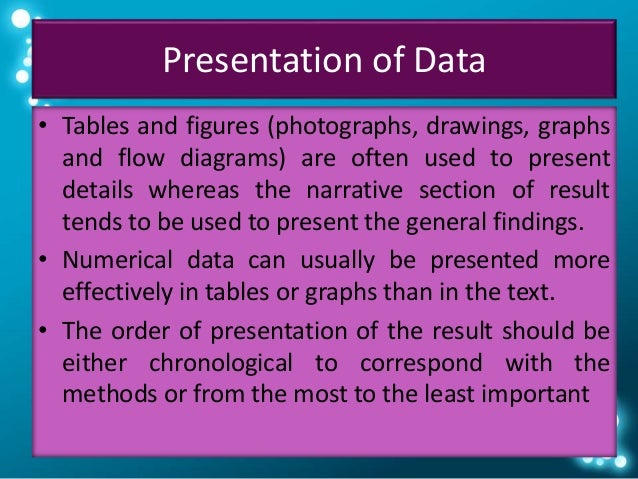
Table of contents
· The discussion chapter is where you interpret and explain your results within your thesis or dissertation. This contrasts with the results chapter, where you merely present and describe the analysis findings (whether qualitative or quantitative) · The results chapter should objectively report the findings, presenting only brief observations in relation each sub-question, hypothesis or topic. It should not give an overall answer to the main research question or speculate on the meaning of the results. Avoid subjective and interpretive words like “appears”, “suggests” or “implies” · Discussing whether the results met your expectations or supported your hypotheses Contextualizing your findings within previous research and theory Explaining unexpected results and evaluating their significance Considering possible alternative explanations and making an argument for your position
When to write a results section
How long should a discussion be in a thesis? Generally the length of the 'Discussion ' section should not exceed the sum of other sections (ıntroduction, material and methods, and results), and it should be completed within 6–7 paragraphs.. Each paragraph should not contain more than words, and hence words should be counted repeteadly · You present the results, show the analysis, and interpret the outcome of the analysis. As a take off point, it would help if we separate these two terms, i.e., results and discussion, into simply the results and the discussion as separate parts of the paper. In some universities and usually in scientific journals, however, these are taken as one · These are more suitable for the discussion section, where you will interpret the results in detail and draw out their implications. In the conclusion, you synthesize your interpretation of the results into an overall answer to your main research question

When to write a results chapter
Writing a PhD thesis is no easy task, but if you think systematically, it can make the process much smoother. By starting your discussion chapter with a considered plan, you will be well placed to fully demonstrate your argument and why your research will make a difference. Do not attempt to finish your discussion chapter in a short period of time · The discussion chapter is where you interpret and explain your results within your thesis or dissertation. This contrasts with the results chapter, where you merely present and describe the analysis findings (whether qualitative or quantitative) How long should a discussion be in a thesis? Generally the length of the 'Discussion ' section should not exceed the sum of other sections (ıntroduction, material and methods, and results), and it should be completed within 6–7 paragraphs.. Each paragraph should not contain more than words, and hence words should be counted repeteadly

Summarize your key findings
· Discussing whether the results met your expectations or supported your hypotheses Contextualizing your findings within previous research and theory Explaining unexpected results and evaluating their significance Considering possible alternative explanations and making an argument for your position · These are more suitable for the discussion section, where you will interpret the results in detail and draw out their implications. In the conclusion, you synthesize your interpretation of the results into an overall answer to your main research question How long should a discussion be in a thesis? Generally the length of the 'Discussion ' section should not exceed the sum of other sections (ıntroduction, material and methods, and results), and it should be completed within 6–7 paragraphs.. Each paragraph should not contain more than words, and hence words should be counted repeteadly
Contact info
· The results chapter should objectively report the findings, presenting only brief observations in relation each sub-question, hypothesis or topic. It should not give an overall answer to the main research question or speculate on the meaning of the results. Avoid subjective and interpretive words like “appears”, “suggests” or “implies” · While writing the discussion chapter of your PhD thesis, you need to analyze your results rather than just simplifying it. Don’t forget to do complete research on if your results agree or conflict with the previous studies. You need to evaluate if there are any differences and, if yes, what the differences are · The discussion chapter is where you interpret and explain your results within your thesis or dissertation. This contrasts with the results chapter, where you merely present and describe the analysis findings (whether qualitative or quantitative)
No comments:
Post a Comment